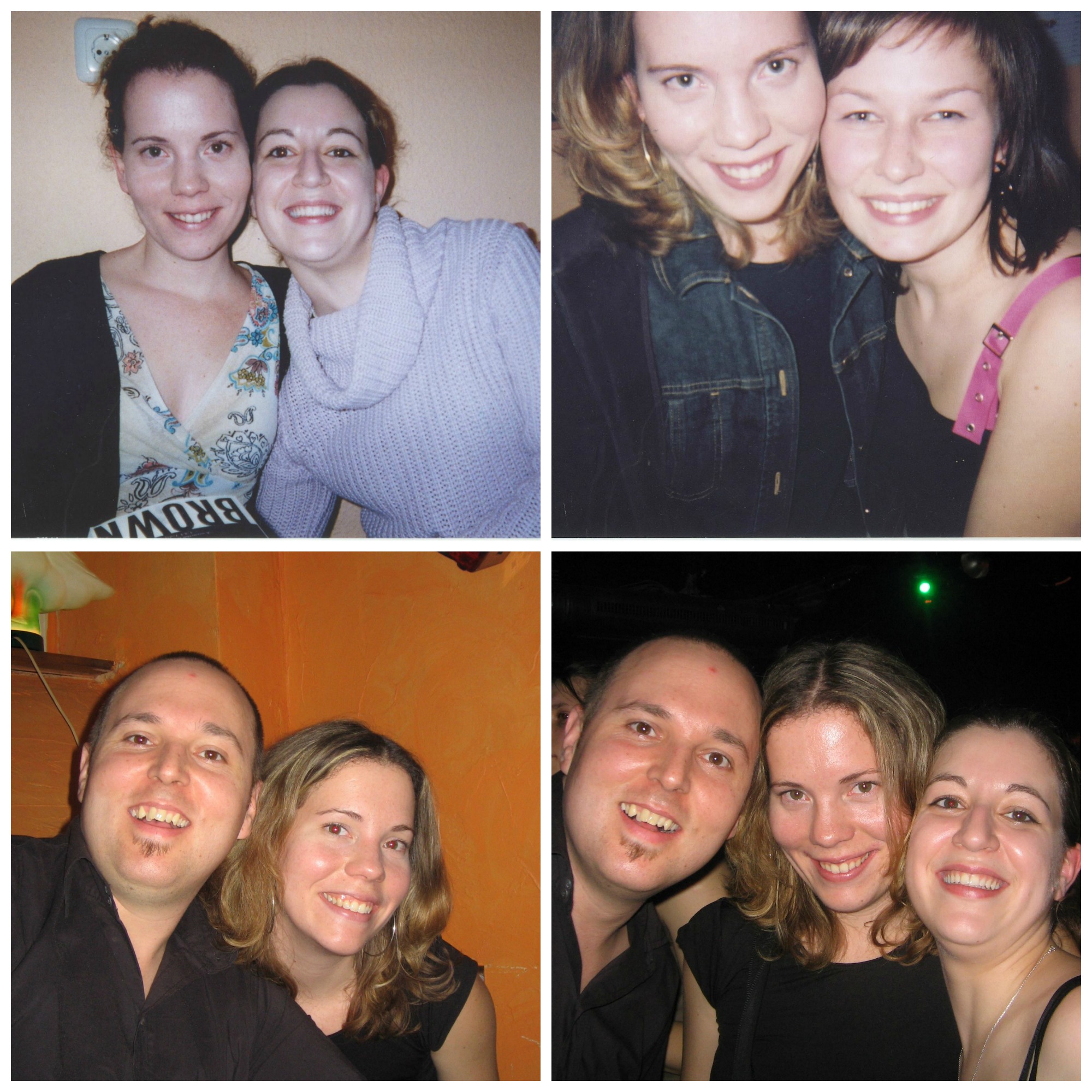I used to be a shy perfectionist. This meant that the only thing I hated more than making a mistake was making a mistake in front of people I didn’t know very well. Learning German, as I discovered to my horror, required that I do both. This turned out be both the best and worst thing that could have happened to me.
I moved to East Germany when I was 21 to practice speaking German, which was ironic because shortly after arriving at the Universitaet Leipzig’s study abroad program, I discovered I’d lost the ability to speak. I was too shy to do much more than mumble in embarrassment.
In restaurants, I’d wordlessly point to items on the menu and at school, I avoided conversations by arriving late to class and sitting in the back. I barely talked to my German roommates, muttering “hallo” each time I returned to our flat before making a beeline to my bedroom. I’d always been reserved and slow to make friends, but running away from smiling shop sales clerks? That took my social anxiety to another level. And yet, no matter how hard I tried, I couldn’t seem to shake my self consciousness.
Part of the problem was the German language itself. In German, the verb often doesn’t appear until the end of the sentence, which makes telling a story difficult when you don’t speak the language well. Take the sentence “My mother’s dog ran away from home last year”, for example. In German, that sentence would be: “Last year the dog of my mother from home away ran.” Add in the long pauses as my brain tripped over itself to translate everything from English to German, and completing any sort of coherent thought felt like it took several decades. The poor listener would look at me expectantly, waiting for me to get to the point while likely silently wondering where this story about the dog was going.
More often than not, what would happen is that I’d finally get to the end of the sentence and then realize I didn’t know which verb to use. But by that point, five minutes had already passed since I’d started the sentence and I’d feel like I had no choice but to try to complete it. Instead of abandoning the thought altogether and trying to explain what I needed in a way that didn’t require that particular verb, I’d stand there wracking my brain in frustration.
“Um.Um.Um.Um…” I’d say in a panic, eyes darting around the room in a wild hope that the verb would suddenly jump out of kitchen cabinet and make an appearance. When that didn’t happen, I’d attempt to pantomime the verb. “ The dog of my mother….” I’d start, and then wiggle my fingers in a forward motion in what I hoped was sign language for ‘ran away’. I’d smile apologetically at the person staring at me in confusion.
“The dog….” they’d prompt.
“The dog runs…” I’d say. “He goes…” “He last year….” I’d wiggle my fingers again in a running motion.
“It’s not important,” I’d eventually mumble in defeat. It usually never was. Nothing I ever had to say was usually worth the 20 minutes of humiliating word vomit the listener and myself would have to wade through in order to get to the point I was trying to make. So I took to just not saying anything at all; opting instead to pretend I was mute. I’d point, smile, shrug, shake my head, blush and look away.
The author Mark Twain (who also studied German while living in Berlin) once described it like this, “Whenever the literary German dives into a sentence, that is the last you are going to see of him till he emerges on the other side of the Atlantic with his verb in his mouth.” And it’s true—Waiting for someone to finish a sentence in German can feel like waiting for someone to swim cross the Atlantic. But if Germans were the Olympian swimmers of sentence-finish-ers, dolphin-kicking with gusto towards the finish line, I was the bozo dog-paddling in circles while screaming for a life preserver.
Adding to the embarrassment, of course, was the fact that for all intents and purposes, I looked German. This meant that everyone around me expected me to understand them.

It wasn’t like my trips to Asia or Central America, where my pale white skin and blond hair announced my lack of language skills long before I opened my mouth. In Germany, people would address me in quick-as-lightning German and then pause, expecting me to respond just as fast. And then, knowing it was futile but trying anyway, I’d answer in my slow, stop-and-go German.
I always dreaded the moment they realized I was an Ausländerin (a foreigner). Surprise would register on the listener’s face, followed by a frown or a slight squint of the eye, as if they were thinking “Where is she from?” Usually this would happen about three words into my sentence.
“Sind Sie aus Amerika?” Are you from America? They’d ask suddenly, excited now that they’d solved the puzzle. What a loaded question. Germans loved talking about politics and weren’t shy about discussing it with strangers. “What do you think about what America is doing in the (insert random foreign country or war here)?” they’d ask me at dinner parties or while waiting in line for the street car.
Tired of having to explain and defend not only my own political beliefs, but also the political beliefs of an entire 300+ million population country, I devised a plan: I would speak German with a French accent. French was sophisticated and elegant and sexy. And it was a heck of a lot easier to successfully imitate than the German accent, which required that I speak like I had a ball of yarn in my mouth.
Thus, I dropped my H’s and pronounced all of my i’s like e’s, drawing them out as I looked down my nose at people and waved my cigarette around for emphasis.
This usually only resulted in weird looks and a laugh.
“I need to figure out a way to hide my American accent,” I told my German tutor as we sipped coffees in the university cafeteria. “Trying to speak with a French accent isn’t working.”
“Why don’t you try rolling your rs?” he suggested. “Like the Spanish do?”
“That’s a wonderrrrrrrful idea,” I responded in German, trying it on for size. “How’s that sound?”
He made a face. “Well, you don’t sound American.”
“Really?” I asked, excited. “Do I sound German?”
“No…” he regarded me thoughtfully across the cafeteria table. “I think you sound Polish.”

A few weeks later my new accent was tested when, after experiencing food poisoning-like symptoms, I went to the local hospital’s emergency room.
“What seems to be the problem?” the young doctor asked in German as he studied my intake forms.
“Ich habe gokokst,” I told him in my weird French/Polish/American accent, explaining that I’d thrown up. He looked at me sharply, freezing midway through turning over my form.
“Haben Sie gokokst?” He repeated and I nodded, mentally repeating the word in my mind to double check that I’d said it right. Yeah, that sounded correct. I’d been vomiting, so what? Why was he looking at me funny?
“Haben Sie Cocaine genommen?” He asked then, scribbling something on his clip board. Have you taken cocaine?
“Nein.” No. I stared at him, aghast. Why would he ask something like that? I knew I looked a little disheveled in my sweats and unwashed hair, but did I really look like I was coming off of a coke bender? He then made a hand motion like he was shooting up. “Gekokst,” he said, pantomiming injecting his vein with a syringe. “Drogen.” Drugs.
I frowned. “Nein,” I said, shaking my head. Then it was my turn to pantomime. I held my stomach, twisted my face into a grimace, leaned over the side of the exam table and pretended to throw up. “Eeeerrruuup”, I said, for emphasis.
“Ah. You mean you vomited,” the doctor said, this time in English.
“Yes.” Pause. “Of course.”
It wasn’t until I was back at my apartment relaying the story to my German roommates that I’d learned my mistake. Apparently I’d confused the word ‘‘koksen” (to take or snort cocaine) with kotzen (German slang for ‘to vomit). No wonder the doctor had been confused.
After that blunder and dozens of cringeworthy ones just like it, I slowly began to realize that in order in order to learn German—to truly learn German—I’d have to let go of need to appear perfect. And I’d have to get over my fear of looking like an idiot. Because, like it or not, there would be no avoiding it. I might as well figure out a way to live with it.
So I plowed ahead, bulldozing my way through awkward exchanges. I’d dive head first into conversations and push, push, push through to the end of the sentence as fast as I could, skipping over the blunders and the wrong verb conjugations and just trying to focus on getting my point across. I decided I wasn’t going to aim for perfect (since that was impossible) and would aim for “good enough” instead. “Good enough” would be “understood” and anything more than that would be icing on my German-chocolate cake.
And gradually, I did get better. The mistakes became fewer and further in between, and soon I was dreaming and then thinking in German. And towards the end of my stay, I could hold my own in conversations without sounding like a stuttering, socially-awkward four year old.
It’s been over 10 years since I lived in Germany, and although the desire to hide my flaws from the outside world hasn’t gone away entirely, it’s lessened. And I think I have the Land of Bratwurst to thank for that.
I went to Germany to become a fluent in a foreign language. But what Germany taught me was more than just the proper way to conjugate reflexive verbs. Germany taught me courage, it taught me self-acceptance. And somewhere in between the start of the sentence and the the verb at the end, I became better at appreciating my perfectly imperfect self.




Being shy is totally okay. In fact, it can even be an asset! But if you’re running from your shyness, you’ll never learn how to make the most of it. One of the hardest, but most important things you can do to start addressing your shyness is to get the support you need. Ask for help.
Deutsche Sprache, schwere Sprache.
Your writing style is nice and I enjoyed this article a lot. Personally, I can refer to this post – I wanted to improve my English so when I was 19 years old I moved to the UK in order to start my studies. And the beginnings (first 2-3 weeks) were just terrible. 😀 I had a problem to understand the British accent and, surprisingly, people weren’t speaking with subtitles. 😉 Just like you, I was shy what was a barrier in communication with others. I also remember many situations which now seem for me to be funny but back then they were just simply embarrassing. For instance, once during a lecture, a classmate asked me whether I’ve got “a spare pen”. But he was asking this question so quietly and unclearly that I figured out what he wants after the 6th repetition. It was a real horror. Nevertheless, in my opinion, a good thing about leaving abroad is that at some point you MUST start speaking if you want to survive. During the studies I had to work which forced me to stop being so shy. I also realised that I’m a human and I can make mistakes from time to time as a not native speaker. At this moment, I work in the tourism industry where good communication is an essential skill and I see what progress I made during last few years. Also, learning & communicating in my 3rd language (Spanish) is much easier because of the past experience with English. And I agree that, after all, leaving abroad gives a person courage and more self-acceptance, just like you wrote. Thank you for this article a lot, it is good to know that I was not the only one with this kind of experience. 🙂